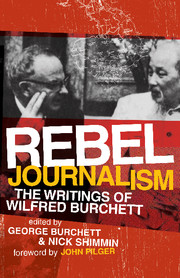Book contents
- Frontmatter
- Contents
- List of Photographs
- Acknowledgements
- Foreword by John Pilger
- Foreword by Gavan McCormack
- Introduction
- 1 The Atomic Plague [1945]
- 2 With Mick Griffith to the Plaine des Lacs [1941]
- 3 Who is Wingate Anyway? [1944]
- 4 The Trial of Cardinal Mindszenty [1951]
- 5 Liberty in Eastern Europe [1951]
- 6 The Microbe War [1953]
- 7 Koje Unscreened [1953]
- 8 The Ball-Point Pen Murders [1954]
- 9 South of the 17th Parallel [1955]
- 10 Front-Line Village [1959]
- 11 Welcome Home [1961]
- 12 Gagarin: The First Interview with Western Journalists [1961]
- 13 Virgin Lands [1962]
- 14 Lilac and Outer Space [1962]
- 15 War Against Trees [1963]
- 16 The Tragedy of South Vietnam's Ethnic Minorities [1964]
- 17 Interview with General Vo Nguyen Giap (April 13, 1964)
- 18 A Fortified Hamlet [1965]
- 19 Patriots & Mercenaries [1965]
- 20 At Ground Level [1966]
- 21 A Spurned Olive Branch [1967/1977]
- 22 Personal Leader [1968]
- 23 The Tet of Peace [1973/1977]
- 24 ‘Something from Nothing’ Township [1976]
- 25 Evaluating the Past [1976]
- 26 Mercenaries: British Export Model [1977]
- 27 The Geneva Conference [1978]
- 28 How to be a Good Khmer Rouge [1981]
- 29 China Prepares to Attack Vietnam [1981]
- 30 Afterword [1983]
- Notes
- Bibliography
- Index
9 - South of the 17th Parallel [1955]
Published online by Cambridge University Press: 22 September 2009
- Frontmatter
- Contents
- List of Photographs
- Acknowledgements
- Foreword by John Pilger
- Foreword by Gavan McCormack
- Introduction
- 1 The Atomic Plague [1945]
- 2 With Mick Griffith to the Plaine des Lacs [1941]
- 3 Who is Wingate Anyway? [1944]
- 4 The Trial of Cardinal Mindszenty [1951]
- 5 Liberty in Eastern Europe [1951]
- 6 The Microbe War [1953]
- 7 Koje Unscreened [1953]
- 8 The Ball-Point Pen Murders [1954]
- 9 South of the 17th Parallel [1955]
- 10 Front-Line Village [1959]
- 11 Welcome Home [1961]
- 12 Gagarin: The First Interview with Western Journalists [1961]
- 13 Virgin Lands [1962]
- 14 Lilac and Outer Space [1962]
- 15 War Against Trees [1963]
- 16 The Tragedy of South Vietnam's Ethnic Minorities [1964]
- 17 Interview with General Vo Nguyen Giap (April 13, 1964)
- 18 A Fortified Hamlet [1965]
- 19 Patriots & Mercenaries [1965]
- 20 At Ground Level [1966]
- 21 A Spurned Olive Branch [1967/1977]
- 22 Personal Leader [1968]
- 23 The Tet of Peace [1973/1977]
- 24 ‘Something from Nothing’ Township [1976]
- 25 Evaluating the Past [1976]
- 26 Mercenaries: British Export Model [1977]
- 27 The Geneva Conference [1978]
- 28 How to be a Good Khmer Rouge [1981]
- 29 China Prepares to Attack Vietnam [1981]
- 30 Afterword [1983]
- Notes
- Bibliography
- Index
Summary
At the 1954 Geneva Conference, Vietnam was temporarily partitioned along the 17th parallel. North of the 17th parallel was the Democratic Republic of Vietnam, proclaimed in August 1945 by the Communist Ho Chi Minh. In the South, the ultra-Catholic Ngo Dinh Diem, backed by the US, had replaced France's proxy ruler, Emperor Bao Dai. Following the Geneva Agreements, internationally supervised elections were scheduled for July 1956 to unite the country and elect a new government. In 1955, Burchett moved his base to Hanoi to observe developments north of the provisional military demarcation line in Vietnam and the implementation of the Geneva Accords.
* * *
In the Introduction to his book, Burchett states that North of the 17th Parallel:
deals with the achievements of reconstruction, the legacy of colonialism, the problem of moving the people's administration from the jungle to take over the cities and industrial centres, the immediate and long-range perspectives for economic progress. Application of the Geneva agreements and the activities of the International Control Commission are analysed and the situation south of the 17th parallel dealt with briefly. The book describes the drama of land reform, the sweeping changes in the lives of the peasantry and the new deal for the minority people.
It is especially directed against the professional line-freezers: those Western politicians and diplomats who during the past ten years have concentrated their energies on creating situations favourable to drawing lines across other people's territories and then freezing them into semi-permanent political boundaries. The book exposes the myth, so popular in certain circles, that the drawing of a line to separate the combatants acted as a magic wand to create two different Vietnams, two different peoples. It is shown that for the Vietnam people, there is only one Vietnam just as there is only one China, one Korea and one Germany.
- Type
- Chapter
- Information
- Rebel JournalismThe Writings of Wilfred Burchett, pp. 88 - 104Publisher: Cambridge University PressPrint publication year: 2007



